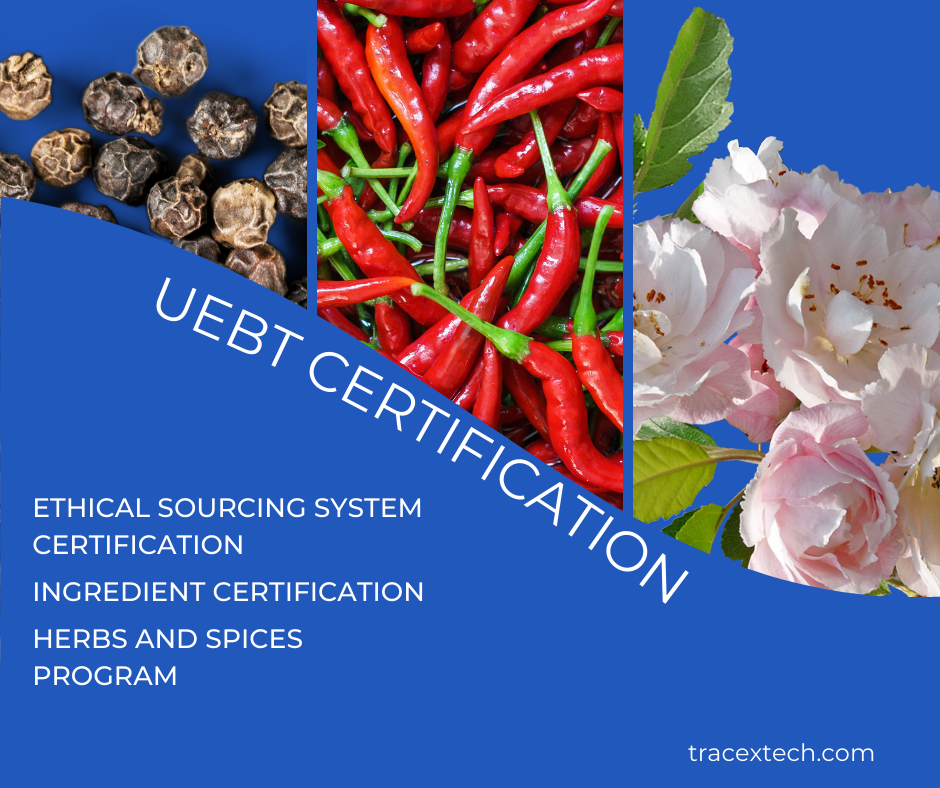Contact: +91 99725 24322 |
Menu
Menu
Quick summary: Unlock the secrets of UEBT compliance in agriculture and discover how to navigate ethical sourcing challenges with confidence. Explore our comprehensive blog to ensure your business meets the highest standards of sustainability and biodiversity preservation.

UEBT (Union for Ethical BioTrade) certification plays a crucial role in ensuring that ingredients sourced from biodiversity are done so with respect for both people and the environment. Have you ever stopped to consider the journey of the ingredients in your favorite food products? Today’s consumers are increasingly concerned about ethical sourcing and sustainable practices throughout the agricultural supply chain. This is where UEBT compliance comes in.
81% of consumers exhibit greater confidence in companies whose dedication to ethically sourcing biodiversity is authenticated by independent organizations.
The Union for Ethical BioTrade (UEBT) defines compliance as adhering to ethical principles when sourcing, producing, and trading biodiversity-based products. These principles include respect for biodiversity, equitable benefit sharing, and the rights of indigenous peoples and local communities. UEBT compliance entails developing sustainable practices, guaranteeing traceability throughout the supply chain, and gaining certification to indicate a commitment to ethical sourcing and biodiversity preservation.
When an ingredient is UEBT certified, it signifies that it has been obtained through practices that prioritize biodiversity conservation, protect endangered species, and reduce the use of harmful agrochemicals. However, it’s essential to note that UEBT certification is distinct from organic certification and the ‘cruelty-free’ mark. While UEBT certification focuses on ethical sourcing, it complements other certifications, such as organic labels, to create a more sustainable and responsible supply chain. Auditors assess local entities and sourcing areas to verify compliance with the UEBT standard, emphasizing traceability and ethical practices throughout the entire process.
UEBT compliance is critical in agriculture since it promotes sustainability and responsible sourcing methods. Adhering to UEBT principles helps agricultural producers conserve biodiversity, preserve ecosystems, and protect indigenous knowledge. Furthermore, UEBT compliance fosters consumer trust, which is increasingly important as ethical and sustainable products become more popular. By incorporating biodiversity conservation into agricultural operations, UEBT compliance promotes long-term environmental resilience and the livelihoods of local communities that rely on biodiversity resources. Overall, UEBT compliance in agriculture is critical for promoting ethical trading, preserving biodiversity, and creating sustainable development.
Responsible practices can drive environmental conservation, social welfare and business success.
Discover how sustainable sourcing practices can transform agribusiness.
The Union for Ethical BioTrade (UEBT) establishes basic guidelines for the ethical sourcing and trade of biodiversity-based products. These principles include the following:
1. Respecting biodiversity, guaranteeing the sustainable use of natural resources, and conserving ecosystems.
2. Respect for indigenous peoples’ and local communities’ rights, including recognition of traditional knowledge and equitable benefit sharing.
3. Adherence to applicable laws and international agreements regarding biodiversity conservation and sustainable development.
4. Improving supply chain sustainability by supporting responsible sourcing, production, and trading practices.
5. Transparency and traceability, which ensures that biodiversity-based products’ origin and impact are clearly documented.
The UEBT’s ethical and biodiversity standards include a variety of criteria for evaluating the sustainability and ethical sourcing of biodiversity-based products. These guidelines contain provisions for preventing biodiversity loss, protecting endangered species, and encouraging fair and equitable benefit sharing with local residents. UEBT guidelines also emphasise ethical labour practices, human rights protection, and respect to international biodiversity conservation treaties. Compliance with these standards necessitates rigorous monitoring, verification, and certification systems to guarantee that biodiversity-based products meet ethical and biodiversity requirements across the supply chain.
The application of UEBT compliance varies per agricultural sector, based on the reliance on biodiversity resources and the involvement of indigenous peoples and local communities. Herbal medications, natural cosmetics, and dietary ingredients produced from wild plants frequently require UEBT compliance due to their direct reliance on biodiversity. Conversely, industries such as conventional agriculture or large-scale monoculture farming may be less applicable because they do not directly engage biodiversity-based goods or indigenous communities. However, initiatives to incorporate UEBT principles into these sectors can continue to promote sustainability and responsible sourcing practices, as well as biodiversity protection and equitable benefit-sharing among agricultural businesses.

UEBT compliance applies to all stages of the supply chain, including sourcing, manufacture, and trade. UEBT compliance typically covers the following stages of the supply chain:
UEBT compliance attempts to incorporate ethical and biodiversity criteria throughout the supply chain stages in order to promote responsible sourcing and trade of biodiversity-based products.
The Union for Ethical BioTrade (UEBT) sets specific requirements and guidelines to promote ethical and sustainable sourcing practices in biodiversity-based products. These include:
The certification process consists of numerous parts, including application, assessment, and audit. The applicant provides documents proving conformity with UEBT standards. An impartial certifying authority conducts an assessment to ensure compliance. If found compliant, the applicant is granted UEBT certification, which allows them to use the UEBT label on their products. Audits are undertaken on a regular basis to ensure that UEBT criteria are met.
UEBT compliance benefits farmers, businesses, and consumers alike.
Case studies indicate the favourable effects of UEBT compliance. For example, a cosmetics company that sources products from Amazonian indigenous communities follows UEBT guidelines, which provide fair remuneration for native harvesters and sustainable resource management techniques. Another example is a food corporation collaborating with smallholder farmers in Africa to promote sustainable agriculture and biodiversity protection while also empowering local people through training and capacity-building programmes. These examples demonstrate how UEBT compliance can positively impact biodiversity, livelihoods, and consumer confidence.
UEBT compliance confronts various problems, including :
As a result, while UEBT certification is a useful foundation for encouraging ethical commerce, it should be supplemented by broader sustainability programmes and regulatory measures to properly address these shortcomings.
Technology is critical in promoting UEBT compliance because it allows for greater transparency, traceability, and accountability across the supply chain. For example, blockchain technology can be used to establish immutable transaction records, providing transparency in biodiversity-based product sourcing and commerce. Geographic Information Systems (GIS) can help map biodiversity hotspots and monitor the origin of raw resources, allowing for the identification of sustainable sourcing sites. Furthermore, digital platforms can facilitate stakeholder communication and data sharing, improving collaboration and monitoring efforts to maintain UEBT compliance.
TraceX blockchain traceability solutions empower companies to overcome the challenges of achieving UEBT compliance by ensuring supply chain transparency, verifying ethical sourcing practices, enabling accountability and auditing, and enhancing consumer trust.
1. Supply Chain Transparency: TraceX leverages blockchain technology to create an unalterable record of transactions and movements within the supply chain. This ensures complete transparency, allowing stakeholders to trace the origin of raw materials and track their journey throughout the production process.
2. Ethical Sourcing Verification: With TraceX, companies can verify the ethical sourcing of their raw materials by securely documenting each stage of the supply chain on the blockchain. This includes details about sourcing practices, labor conditions, and environmental impact, enabling companies to demonstrate compliance with UEBT standards.
3. Accountability and Auditing: TraceX provides a robust platform for accountability and auditing by recording every transaction on the blockchain. This creates a tamper-proof audit trail that can be accessed by regulators, auditors, and consumers to verify compliance with UEBT requirements.
4. Enhanced Consumer Trust: By leveraging TraceX blockchain traceability solutions, companies can build trust with consumers by providing transparent and verifiable information about the ethical sourcing of their products. This transparency fosters consumer confidence and loyalty, driving demand for UEBT-compliant products.
Conclusion
In conclusion, understanding and achieving UEBT compliance is essential for companies committed to ethical sourcing and sustainability in their supply chains. By embracing UEBT standards and leveraging solutions like TraceX blockchain traceability, organizations can ensure transparency, verify ethical practices, and build trust with consumers. This not only enhances brand reputation but also contributes to the preservation of biodiversity and the well-being of communities involved in the production process. With a comprehensive understanding of UEBT compliance and the right tools at their disposal, companies can navigate the complexities of modern supply chains while upholding ethical and sustainable practices.
